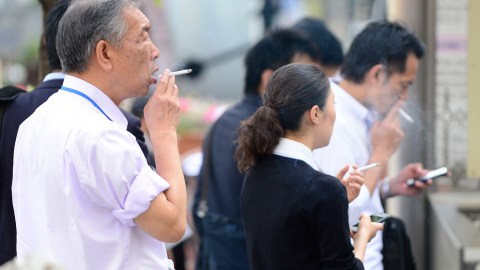Japanese company rewards non-smoking employees with extra vacation time

A Tokyo-based company is rewarding its nonsmoking employees with six extra days of vacation.
It started when an employee at Piala Inc., a marketing firm in Tokyo’s Ebisu district, lodged a complaint.
“One of our nonsmoking staff put a message in the company suggestion box earlier in the year saying that smoking breaks were causing problems”, Hirotaka Matsushma, a representative for Piala Inc., told The Telegraph. “Our CEO saw the comment and agreed, so we are giving non-smokers some extra time off to compensate.”
Piala is located on the 29th floor of its building, so each smoke break takes at least 15 minutes.

BEHROUZ MEHRI / GETTY
“I hope to encourage employees to quit smoking through incentives rather than penalties or coercion,” said Takao Asuka, CEO of Piala Inc., to Kyodo News.
It seems to be working. So far, at least four employees have quit smoking since Asuka began offering the vacation time, and at least 30 of the nonsmoking employees have already taken advantage of the extra time off, according to Matsushma.
Offering incentives seems to be an effective solution for smoking cessation. In a multitude of studies, participants who were presented with financial incentives tended to quit smoking and stay smoke-free more than those in control groups.
However, it’s unclear whether those results would translate directly to Japan where 21.7 percent of Japanese adults smoke. The World Health Organization lists Japan at the bottom of the list in terms of anti-smoking policies according to the types of spaces that are entirely smoke-free.

Some in Japan want to change that. Tokyo governor Yuriko Koike will reportedly push for a law to ban smoking in public places, which would render the capital smoke-free for the 2020 Summer Olympics. The bill is likely to face strong opposition, however, considering that a past attempt at a national ban was killed thanks largely in part to Prime Minister Shinzo Abe’s party, restaurateurs, and Japan Tobacco, a one-third government-owned company that paid the state $700 million in dividends in 2015.
Still, in addition to Piala, some private Japanese companies are taking it upon themselves to curb smoking rates among their employees. Lawson Inc., a convenience store chain, recently banned smoking at its head and regional offices for about 4,500 of its employees. Other organizations have converted their smoking rooms to lounges. And more companies are expected to ban in-house smoking altogether in coming years.
It may ultimately be stigmatization from peers that influences many Japanese smokers to quit.
“I am no longer shunned by nonsmokers as I have rid myself of the odor of cigarette smoke,” said Masayuki Seto, an executive at a life insurance company, to the Japan Times.





